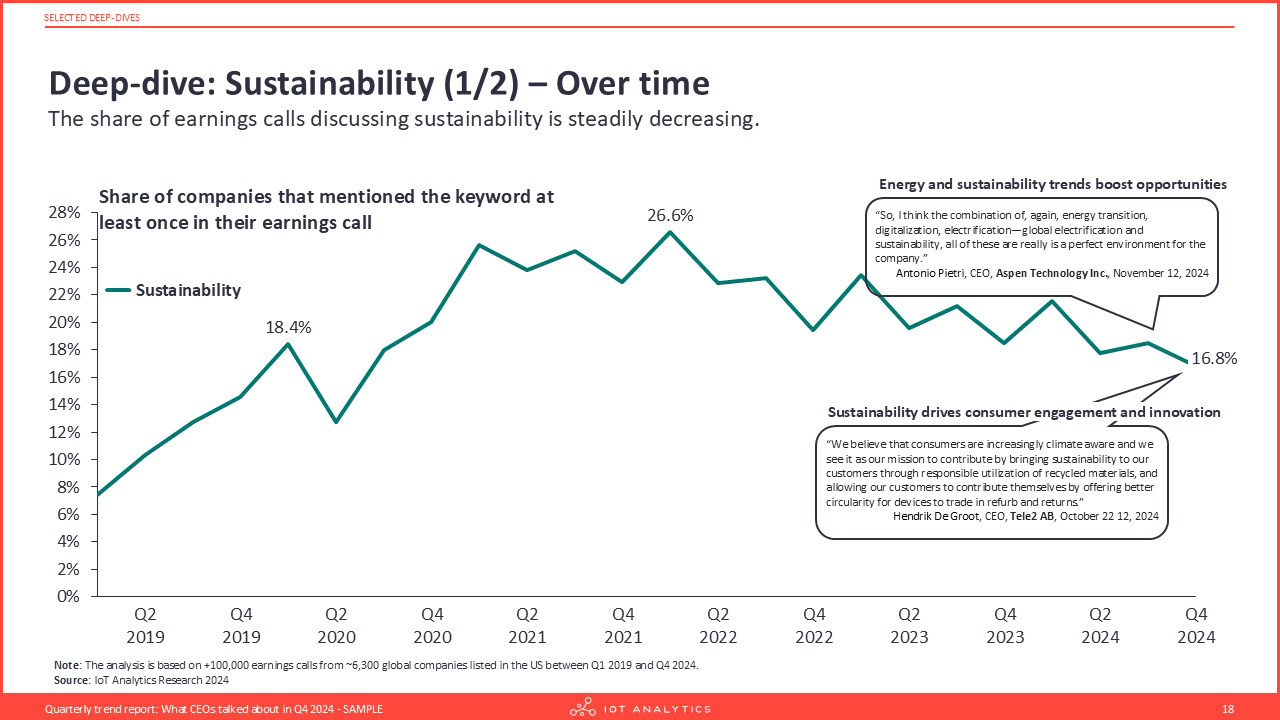The Essence of Ingenuity
Kathleen Vohs | Backtracking on Climate Change and the Environment | Factoids | Elsewhere
Divergence from the status quo is the essence of ingenuity.
| Kathleen Vohs, It’s Not ‘Mess.’ It’s Creativity.
…
It was the status quo to commute five days a week to the office. We learned it was possible to work in a decentralized way, through ingenuity. And now, some want to forget what has been learned.
Backtracking on Climate Change and the Environment
IOT Analytics is a research firm that tracks what businesses are thinking about through — among other means — topics that surface in companies’ earnings calls. Here is one of their charts that shows the ebb and fall of sustainability in that context.
Mentions of sustainability reached a peak of 26.6% in early 2022, and most recently dropped to 16.8% in Q4 2024.
Let’s, for the purposes of discussion, assume that mentions in earnings calls is a proxy for what is deemed important in board room and C-suite planning.
So sustainability has dropped back to a pre-pandemic level of importance… or unimportance. But that can’t really make sense, can it? The transition to clean energy, the critical state of climate change, and growing awareness of the harm arising from the use of plastic — these issues are becoming more critical, not less.
But the fact that corporate executives can blind themselves to their obligations to their customers, employees, communities, and posterity is no surprise.
Consider the environmental toll of commuting, on which many large corporations have gone retrograde, demanding that employees get their butts back in the office. Their arguments are all the same — better collaboration, more serendipity, ‘stronger’ culture. I won’t rehash the pros and cons of those claims, now, but many companies operate remotely and say that they have those qualities regardless.
Many critics — including me — suggest the Great RTO movement today is actually a surreptitious means to shake loose a lot of workers without laying them off, which saves a great deal for the companies involved. Perhaps the companies over-hired during the pandemic, perhaps they are betting on AI to pick up the slack, perhaps there is some underlying change in the markets, perhaps, perhaps, perhaps. But the movement is happening, and the CEOs aren’t listening to the critics.
Most importantly, those CEOs — and civil society, generally — aren’t confronting the environmental costs of returning full-time to the office, in a country largely dependent on commuting in internal combustion cars.
In 2022 I posted Commuting Is Evil, in which I back-of-enveloped how much carbon commuting in America produces.
How much co2 does commuting create?
I will string together a few factoids to come up with a general estimate of just how much carbon emissions come from commuting in America.
From Julie Chen in Is Remote Work Greener? We Calculated Buffer’s Carbon Footprint to Find Out, I pulled out some data, such as these:
The average American commutes to work by car just under one hour each day – roughly 32 miles, which equates to about 3.2 tonnes of CO2 per person every year.
130 million Americans commuted (2016) by car, truck, or van. I calculate: 3.2 tonnes/per driving commuter * 130 million commuters (2017 numbers) = 416 million tonnes/year.
There are approximately 100 million knowledge workers in the US (2017). Overall, the US produced (2019) 6,558 million metric tons (14.5 trillion pounds) of carbon dioxide equivalents.
So, the bottom line: commuting accounts for approximately 16% of US emissions. We can’t stop retail and other workers from commuting to their jobs, but 100 million knowledge workers could stay home. Again, Julie Chen tells us,
The daily commute to and from work accounts for more than 98% of an employee’s work-related carbon footprint. Having the choice not to commute feels like a great way to cut our carbon footprint.
Some degree of commuting is inescapable, but considering the state of the biosphere it should be criminal to require five days a week in the office when it’s unnecessary. The pandemic showed that most office work could be performed at home, for the great majority of people.
It was a life-threatening crisis, and we all learned how to make it work.
But the climate catastrophe we have created is a crisis, too; one that is getting worse every day. Demanding workers return to offices when it’s unnecessary —because of the whims of CEOs — is deeply immoral, and should be made illegal, too.
The CEOs are using their power to spew metric tons of unnecessary carbon into the environment, and forcing their employees to spend their time and money in commuting.
The economist Austan Goolsbee calculated the economic benefit to the remote worker:
According to the Census Bureau, Americans spent, on average, a record 55.2 minutes a day commuting in 2019, before the pandemic. One in 10 spent more than two hours a day traveling to and from work. In dollar terms, not having to commute five to 10 hours per week is like getting a 10 to 20 percent raise. For someone with average hourly earnings in 2021 (over $30), that time is worth $7,000 to $15,000 per year. Looked at another way, the monetary value of the saved commuting time would be one of the biggest tax cuts the middle class had ever received. If your pay is higher than average or your commute is longer, your benefit is worth even more.
In conclusion: many CEOs are demanding workers return to the office, in some cases five days a week. The environmental and economic impacts of those arbitrary decisions are enormous. Not only is this turning away from sustainability immoral, it should be made illegal. Who are they to demand we commute without paying us for the time and expenses, or offsetting the carbon produced?
The negative climate externalities of this retrograde return-to-the-office movement fall onto all of us, as inhabitants of the planet, and the direct economic impacts fall on all those being forced to commute.
We must make it illegal to do this damage, just like other environmental transgressions. We can’t allow pre-pandemic norms to be reimposed by a cadre of self-important CEOs at enormous damage and expense, without a reckoning. Make them pay.
Factoids
Is homeowners insurance going out of business?
Most homeowners insurers lost money over the last decade and the number of insurers losing money is increasing. The investment dollars earned on capital and surplus at available low-risk and risk-free investments over the same period are insufficient to overcome the losses in the underwriting portfolio. This is despite actively increasing rates over the same period as illustrated in the rate indices later in this report. How long can this continue?
| AON, Homeowners Return on Equity Outlook October 2024
The entire U.S. housing system relies on affordable homeowners insurance. You can’t get a mortgage without insurance, for example.
Uncertainty in assessing risk — largely driven by climate change — is destabilizing the market.
…
Data centers are consuming enormous energy.
The Electric Power Research Institute (EPRI) estimates that data centers could grow to consume up to 9% of U.S. electricity generation annually by 2030, up from 4% of total load in 2023.
Last year, data centers accounted for more than a quarter of electricity consumption in Virginia, a higher fraction than in any other state.
| EPRI
AI bots are eating a lot of juice.
…
The U.S. is forcing people to pee in alleyways.
According to one estimate, the United States has only eight public restrooms per 100,000 people.
| Leah Goodridge, who notes that in a 1990 case brought by four homeless NYC residents over lack of public restrooms an appeals court ruled there is no constitutional right to public restrooms:
The irony is that the legal system could not ensure these homeless plaintiffs public restrooms, but it could ensure that they would be punished for public urination resulting from the lack of such restrooms.
It would be funny if it weren’t so fucked up. In NY State, where I live, there are laws on the books that require any place of business to provide any visitors access to at least the same sort of toilets available to employees. Starting in the ‘60s the state shifted enforcement powers to municipalities, who simply stopped enforcing the law. (See The Trouble With Toilets.)
Time to bring back coin operated public restrooms.
Elsewhere
Is it last-minute expert coaching just a ‘hack’?
Keep reading with a 7-day free trial
Subscribe to Work Futures to keep reading this post and get 7 days of free access to the full post archives.





